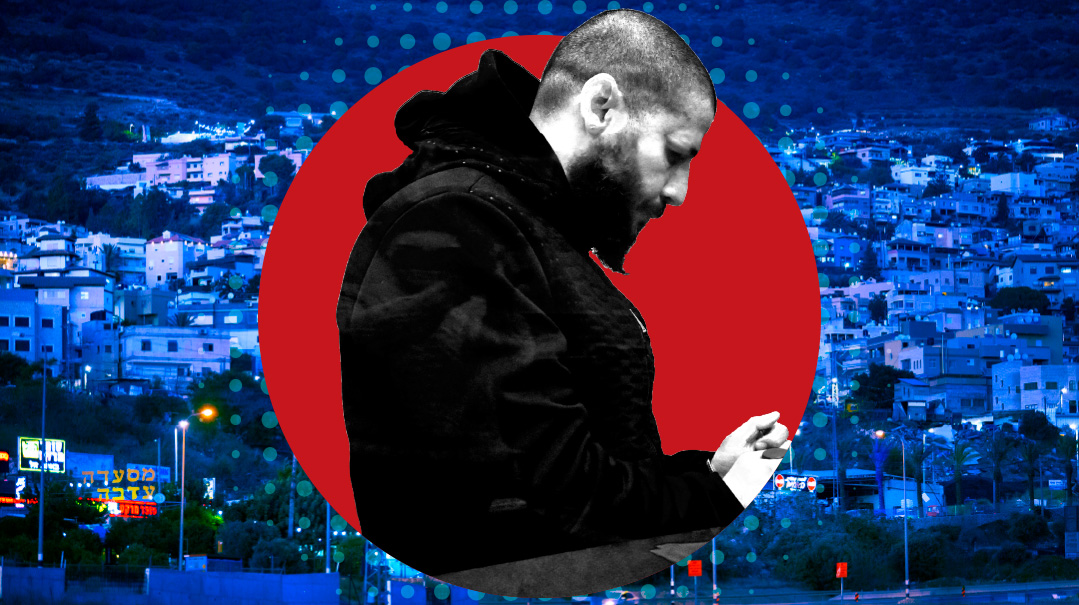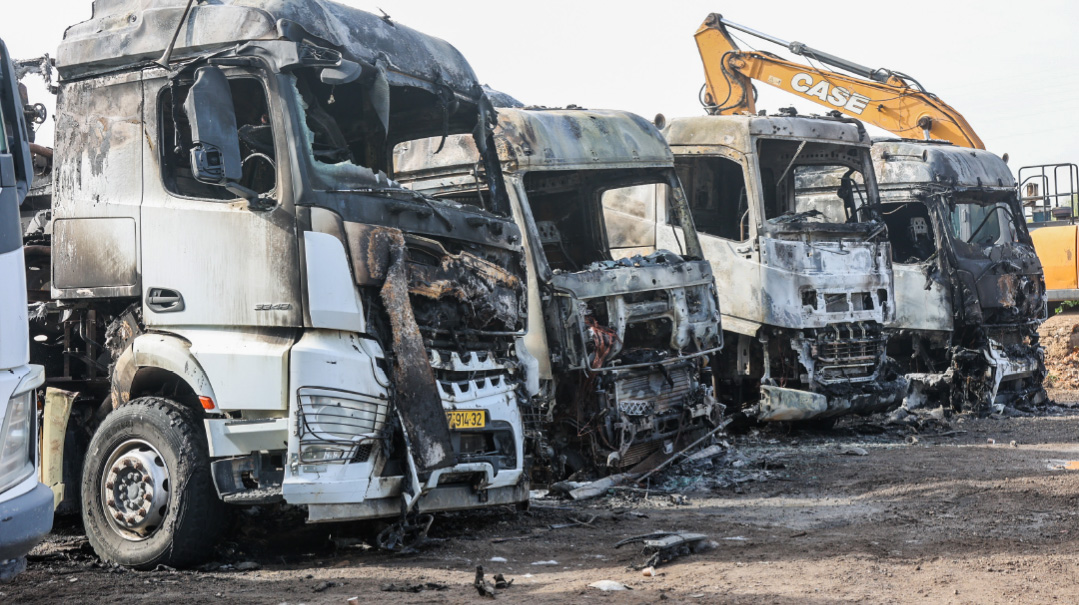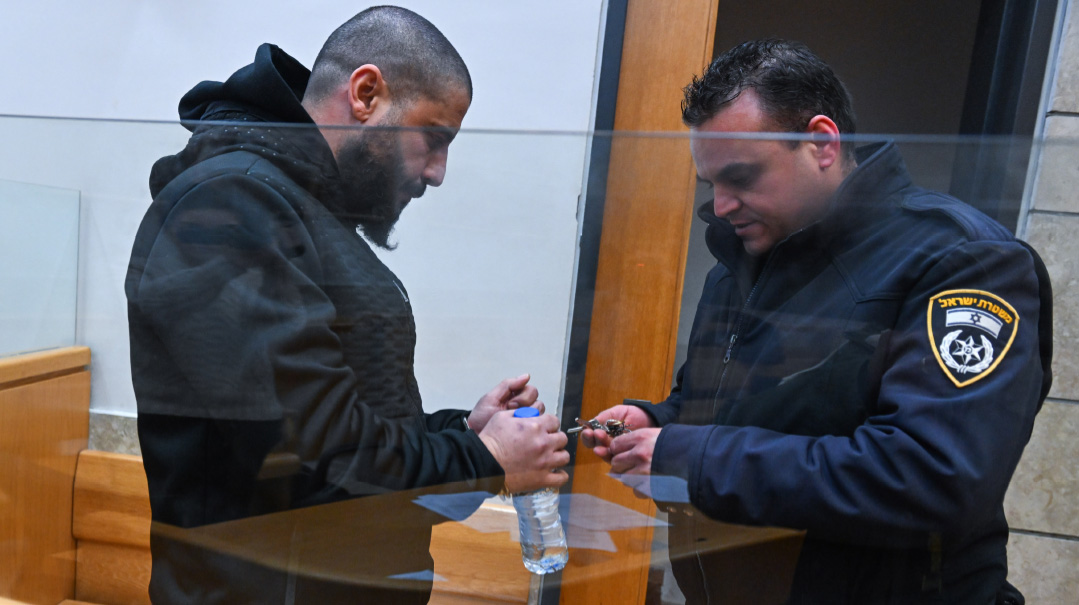Borderline Mafia
| August 29, 2023Does one crime family in Israel, with ties to Hezbollah, pose a national security threat?

Israel’s rampant mafia clans are a growing public menace, turning the country’s periphery into increasingly lawless zones. But the activities of one crime family with ties to Hezbollah suggest that organized crime has crossed the line to threaten national security. Is the mob too close for comfort?
ON
Israel’s northern border with Lebanon, there’s a national-security threat – and it’s not called Hezbollah.
The Abu Latif clan, a prominent Druze crime family active across the country’s north, has won an Israeli government tender to build a range of projects. These include an IDF air force training school near the border, and a section of the sensor-laden border fence itself.
Given the Abu Latif clan’s history of ties with Hezbollah, the family’s involvement in a sensitive government tender reveals a disturbing breach in security amid a growing external threat. But the revelations surrounding the clan over the last few months – accompanied by a series of large police raids to arrest figures associated with the family – highlight how dangerous Israel’s organized crime problem has become.
The saga has also pulled back the curtain on the shady world of Israeli mobsters, highlighting the shifting dynamics as Jewish and Arab clans vie for the lucrative control of entire regional industries.
No longer content with selling drugs, running protection rackets, money laundering, and loan sharking, these criminal organizations are now taking bites from the government budget. And the bigger fear is that, with their connections to and history of consorting with Israel’s enemies just across the border, their new construction jobs pose a potential threat to national security.
“Just think about what it means to win the tender on the border,” an informant told the Israel Police. “Sabotage, arms-smuggling. They take apart the old fence, dig a little tunnel, and G-d knows what comes through. How can you leave the cat to guard the cream?”
Over the past year, the police has acted decisively against the Abu Latif clan, securing an indictment against 13 of the group’s heads. But while a breach this obvious in Israel’s security should be swiftly shut down, law enforcement has been stymied by fearful, reluctant witnesses. The mobsters threaten rival contractors to win contracts for their own construction businesses, and intimidate them into silence.
“It’s very difficult to find people who will cooperate with our investigations, because everyone’s terrified,” explains police superintendent Avishai Golan, head of the investigations department at Lahav 433, the Israel Police unit dedicated to fighting financial crime. “People tell us, ‘I have a family, I have kids. If I cooperate with you, you might protect us for a day, a week, a month — but eventually I’ll be left to my own defenses against the mob.’”

Photo: Flash90
A construction company in a northern town that refused to pay up found their equipment had gone up in smoke
TO understand how serious the revelations are, you have to set the clock back to 2001, when three of the Abu Latif brothers were indicted for aiding Hezbollah, having contact with foreign agents, and smuggling explosives and firearms from Lebanon to Judea and Samaria.
The Abu Latif family is Druze, and based in Rameh, a mostly Arab town of about 8,000 near Karmiel in Israel’s north. The head of the group is the oldest brother, Latif Abu Latif, 53, who has served a cumulative nine years of jail time. Next in line is younger brother Nidal, 43, the group’s financial brain in charge of money laundering, among other things.
Another brother is Alaa, 51, who served a decade in jail for smuggling arms and drugs from Lebanon. The fourth brother is Saliman, 45, who served seven years in jail after being convicted of manslaughter.
The 2001 indictment didn’t stop the Abu Latif group from later winning bids to construct and renovate IDF bases, fire stations, prison services buildings, and even police stations in Jisr az-Zarka, an Arab town north of Caesarea, and Segev Shalom in the south, as well as building parts of the security fence on the border with Judea and Samaria.
In the Abu Latif mob, the police have had to fight a beast that extended its tentacles into municipal government itself. Two weeks ago, police arrested the local council head of Rameh, a small Arab town in northern Israel, Shauki Abu Latif. Shauki is accused of aiding the crime ring by extorting protection money from local businesses. During his interrogation, he threatened that “people would die” if he wasn’t released.
In a hearing at the Rishon L’Tzion court following Shauki’s arrest, a police representative said, “This is the first time that a crime organization has been caught using an elected official. This takes it to a whole new level.”
Shauki’s son Razi was also arrested, on suspicion of firing guns and throwing explosives at local business owners who refused to pay protection money to the crime syndicate — which included his father, the head of the municipal council.
“These brothers are running a multipronged criminal operation,” says Golan. “We’re talking drugs, arms-smuggling, casinos, money-laundering, and a whole host of crimes aimed at maximizing the group’s profit.”
Those revenues are prodigious, to judge by the clan’s outward wealth. With money pouring in from control of nursing homes, tobacco stores, butcheries, and garbage collection companies, members of the family own large villas in Israel and abroad and drive luxury vehicles; they own jewelry, assets, and businesses worth millions.
Success has bred a sense of impunity. After law enforcement cracked down on illegal construction at Nidal’s home in Kfar Vradim, his foot soldiers visited 12 local bank branches and fired their guns in warning, leading to civilian casualties. When health inspectors swooped in on one of their butcheries, the organization allegedly responded by planting a bomb at the entrance to a Health Ministry building. In another incident, a police officer who issued a traffic fine to a member of the organization was threatened with death.
No Boundaries
The Abu Latif case has highlighted the dynamics of the Israeli underworld. Crime syndicates in Israel are usually family affairs, whether they’re in the Jewish, Muslim, Druze, or Bedouin sectors. “Crime families don’t specialize in any particular field,” a senior officer in Israeli police’s crime fighting unit tells us. “They do whatever brings in revenue — drugs, protection, extortion, money laundering, loans, or casinos.”
Much like Mafia operations in the US, Israeli crime rings are named after a leading family — e.g., Abergil, Alperon, Abu Latif, or Hariri — and are run like a military hierarchy with foot soldiers and commanders.
“These are extremely regimented, departmentalized groups,” says the police source. “Everyone has a role. There’s the top brass, usually brothers or cousins. Then there are the ‘department heads,’ those in charge of the gambling, protection, or extortion operations. At the bottom of the food chain are the hired guns, usually young men who will take down anyone they’re asked to for NIS 1,000.”
In 2010, WikiLeaks leaked a US embassy memo about Israel’s crime families. “Five or six crime families have traditionally dominated organized crime in Israel, although the names and makeup of these syndicates have fluctuated in recent years,” the paper noted. “The Abergil, Abutbul, Alperon, and Rosenstein organizations are among the most well-known, but recent arrests and assassinations have created a power vacuum at the top. New names such as Mulner, Shirazi, Cohen, and Domrani have moved quickly to fill the gap. Other up-and-coming groups include the Harari, Ohana, and Kedoshim families. There are also a number of rival families active in the underworld of Israel’s Arab sector.”
In 2015, the longstanding Israeli crime syndicates received a mortal blow as a result of “case 512,” with around 20 heads of various groups being rounded up. The vacuum was filled by Arab crime families, which are considered even more ruthless and dangerous.
The largest of these is the Abu Latif group, which operates mainly in the north, from Hadera to the Lebanese border. Then there’s the Hariri clan, which also operates in the north, and lastly the Araar family, which operates in the region of Jaljulia and the Sharon in the greater Netanya region.
Other leading groups include the Kraaja family, which operates around Baqa al-Gharbiyye, Gat, Harish, and the coastal region; the Jarusi family, operating mainly in the area of Ramleh and the center of the country; the Abu al-Kian gang in the south; and the al-Areish clan around Umm al-Fahm.
What most of these clans have in common are tactics: in recent years, the Israeli police has been faced with the rising phenomenon of protection rackets. “A representative of the local crime ring shows up at the business and informs the owner that he has to pay them protection money that can run into hundreds of thousands of shekels,” the police source explains.
“If he doesn’t pay, they’ll destroy his business. If he refuses once, they’ll fire some warning shots at his home or business. The second time, they’ll burn it down. The third time, they’ll shoot to kill. They have no boundaries.”
Recently, the police say, Abu Latif realized it could turbo-charge its income by taking advantage of various legitimate opportunities such as government tenders on public works projects.
Toward this end, the group uses its soft power. “The family has a ‘reputation,’ and you can put quotation marks around that word,” says superintendent Golan. “Go up north. From the moment you cross Hadera Junction, the name ‘Abu Latif’ inspires fear. They keep up their reputation by regularly carrying out serious criminal offenses, and they make sure that everyone knows who’s behind them.”
Over the past few months, the group managed to win one of the most sensitive public tenders in the country — a Defense Ministry contract for constructing a training school for the air force, right near the border with Lebanon. A competing contractor not affiliated with Abu Latif initially won the tender, but then pulled out under mysterious circumstances. In a conversation with Lahav 433 investigators, a worrying picture emerged.
Parts of one conversation were made public by Channel 12’s Omri Maniv:
Contractor: “We were given the option either to transfer the job to this other contractor and we’d act as their front man, or to just pull our bid. We decided to pull out of it altogether.”
Interrogator: “You decided to pull out even though it was expected to yield a substantial profit.”
Contractor: “Yeah, what can I do?”
Interrogator: “Who was the other contractor?”
Contractor: “Come on, man, you know who it is.”
Interrogator: “Then why won’t you say?”
Contractor: “I don’t want to get in trouble.”
And if the competing contractor didn’t understand threats, Abu Latif had a way of making things clear. In a recording obtained by the police, Abu Latif can be heard briefing one of his henchmen: “Tell [the contractor]: the job here in the north belongs to us, no one else gets it. Give him this message. Tell him: ‘The man isn’t going to back down. Period.’ ”
When a police interrogator asked one of the threatened contractors why he hadn’t complained to the police, the contractor replied: “It doesn’t help. People who call the police only get into worse trouble. Just take the trucking contractor from the north [who tried working with the police] — they burned down his whole business. It’s endless. You have kids at home, you have parents. No one can enter their territory. We lose out financially and no one complains [to the police], because nothing will be done. No one wants to risk angering them because they have families to think of.”
Another contractor recounted: “Two men came to the briefing [on the government tender]. In front of everyone, next to the council head, they said, ‘Don’t bid.’ And then they left, just like that. Not a single person there submitted a bid. In the north, you have to think very carefully before you submit a bid. I don’t know anyone who wants those folks to drop by his office for a cup of coffee. We’re just regular people, we just want to go to work and come home in one piece, that’s all.”

A member of the Abu Latif family in a court appearance
Long Road
While many Israelis had the luxury of remaining oblivious to the growing threat of organized crime as long as it stayed in Arab cities, the growing brazenness of crime gangs can no longer be ignored.
Last year there was a public outcry when it was revealed that a large Israeli company had set aside a “protection budget” for its branches located in mafia-dominated areas.
But it’s the addition of a national security dimension that has put the issue on the political agenda. The violence in mixed Jewish-Arab cities in summer 2021 spotlighted the increasing lawlessness in Israeli Arab society, and its potential to destabilize Israel internally at a time of military conflict.
Arab lawmakers such as MK Ahmad Tibi contend that it’s the failure of successive Israeli governments to invest in the Arab sector that has led to the current crisis. Others, such as Minister of Heritage Amihai Eliyahu, contend that it’s Arab culture that is itself at fault. “When a child of three fires a gun at a wedding and the parents look on proudly, that is a culture that invites violence,” he said.
Whatever the underlying reason, the problem can no longer be shoved under the rug or dismissed as a marginal concern that only affects specific regions or clans. When criminality crosses over into a national security threat, it becomes everyone’s problem.
As the debate over policing in the Arab sector gets underway, the Abu Latif group will be forefront of lawmakers’ minds.
For his part, Superintendent Golan says that the police’s crackdown against Abu Latif has critically impaired its operations, and the arrest of Shauki, head of the local council. is also a heavy blow to the group.
But the residents of Israel’s periphery, where law enforcement is weakest, say that the wave of arrests is just the first step. This is a crime family with many arms and a bitter record of revenge. In order to assure continued cooperation with police, informants have to trust that officers will be there to defend them even when the arrests have stopped.
As one contractor who’d been threatened with Abu Latif’s retribution pleaded with police: “Don’t throw me to the wolves. If anyone thinks I opened my mouth, I’m a goner. What do I need this for?”
(Originally featured in Mishpacha, Issue 976)
Oops! We could not locate your form.







